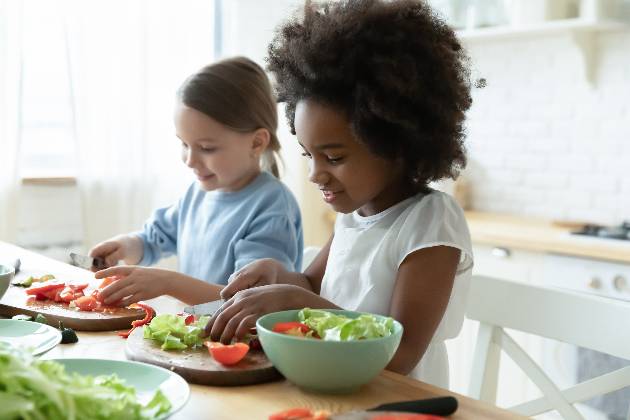Every child should learn to cook for essential life skills and healthy eating habits. Learning to cook empowers children and prepares them for independence and self-sufficiency in the future.
It fosters creativity, promotes healthy eating habits, and cultivates an appreciation for different cultures and cuisines. Cooking also provides an opportunity for children to develop math and science skills through measuring and understanding chemical reactions. Additionally, it encourages teamwork and collaboration when cooking with family and friends.
Moreover, cooking at a young age instills a sense of responsibility and fosters a positive relationship with food. Furthermore, it equips children with the knowledge to make informed food choices that can benefit their overall health. In today’s fast-paced world, teaching children how to cook is an invaluable life skill that will serve them well throughout their lives.
The Importance Of Teaching Kids To Cook
Teaching kids to cook is a vital skill that can have a lasting impact on their lives. Beyond just being able to prepare their own meals, learning to cook instills a sense of independence, fosters healthy eating habits, and can even ignite a passion for creativity in the kitchen. In this section, we’ll explore the myriad benefits of teaching kids to cook, from instilling healthy eating habits to encouraging independence and self-sufficiency.
Health Benefits
Teaching kids to cook empowers them to make healthier food choices, leading to improved overall well-being. By involving children in the cooking process, they become more interested in the ingredients and the nutritional value of the food they eat. This not only helps in the development of a healthy relationship with food but also encourages them to make balanced choices when it comes to mealtime.
Independence And Self-sufficiency
Learning to cook equips children with a valuable life skill that fosters independence and self-sufficiency. By teaching kids to prepare their own meals, they become less reliant on pre-packaged or takeaway foods, gaining autonomy in their dietary choices and becoming more self-sufficient in managing their nutrition.
Developing Essential Life Skills
Learning to cook is an invaluable skill that goes beyond creating delicious meals. It helps children develop essential life skills that will benefit them throughout their lives. From understanding nutrition to budgeting and meal planning, cooking equips children with practical knowledge that fosters independence and healthy living.
Understanding Nutrition
Understanding what goes into a balanced meal is crucial for a child’s overall well-being. Through cooking, kids can learn about the nutritional value of different foods, the importance of incorporating fruits and vegetables into their diet, and how to make healthy choices when preparing meals.
Budgeting And Meal Planning
Cooking teaches children the value of budgeting and meal planning. By involving them in the process of creating shopping lists, comparing prices, and preparing meals within a budget, kids develop essential financial literacy skills that will serve them well in the future.
Building Confidence And Creativity
Building confidence and creativity through cooking is an essential skill that every child should learn. By engaging in hands-on learning and cultivating a love for food, children can develop both confidence in their abilities and their creativity in the kitchen.
Hands-on Learning
Hands-on learning in the kitchen allows children to explore and understand the basics of cooking. By actively participating in the preparation of meals, they can gain a practical understanding of food and its manipulation, which can ultimately build their confidence in handling kitchen tasks. Whether it’s mixing ingredients, rolling dough, or chopping vegetables, these practical experiences instill a sense of accomplishment and mastery in children, nurturing their confidence and creativity.
Cultivating A Love For Food
Cooking encourages children to cultivate a love for food by getting them involved in the process of creating meals. Exploring different ingredients, flavors, and textures can spark curiosity and creativity in children. This exposure not only promotes healthier eating habits but also allows them to develop a deeper appreciation for the culinary arts. As they experiment with various recipes and cooking techniques, they are empowered to unleash their creativity, leading to greater confidence in their cooking skills.

Credit: www.gohenry.com
Fostering Family Bonding
Cooking together with children can be a wonderful way to foster family bonding. It provides an opportunity for parents and children to spend quality time together while engaging in a wholesome and educational activity. Through cooking, families can share traditions and cultures, creating lasting memories and a strong sense of togetherness.
Cooking Together
Cooking as a family encourages communication and teamwork. Working together to prepare a meal teaches children valuable life skills while allowing them to bond with their parents. The shared experience of cooking can create a sense of belonging and togetherness within the family.
Sharing Traditions And Cultures
Cooking traditional family recipes or exploring cuisines from different cultures can open up conversations about heritage and history. It allows parents to pass down their culinary knowledge and instill a sense of cultural pride in their children. Through cooking, families can celebrate their unique backgrounds and create a stronger bond.
Frequently Asked Questions Of Every Child Should Learn To Cook
What Are The Benefits Of Cooking For Kids?
Cooking for kids helps develop their taste preferences, encourages healthy eating habits, and boosts their confidence and creativity. It also provides opportunities for learning math, science, and practical life skills, and strengthens family bonds through shared meal preparation and enjoyment.
Is It Important For Everyone To Learn How Do You Cook?
Yes, learning to cook is important for everyone as it promotes independence and healthy eating habits. It allows individuals to be self-sufficient and explore their creativity in the kitchen. Developing cooking skills also leads to better nutrition and saves money on eating out.
Why Should Students Be Taught Cooking?
Students should be taught cooking to develop life skills, encourage healthy eating habits, and foster independence. Learning to cook helps with budgeting, time management, and enhances creativity. Additionally, cooking promotes cultural understanding and teamwork.
Why Should Schools Teach Kids To Cook?
Schools should teach kids to cook to promote independence, healthy eating habits, and life skills. Cooking enhances creativity, boosts confidence, and teaches kids about nutrition. It also fosters teamwork and cultural appreciation, preparing them for the future.
Conclusion
Teaching kids to cook offers lifelong benefits. Whether it’s learning essential life skills or fostering independence, cooking plays a crucial role in a child’s development. With the rise in obesity and poor dietary habits, teaching children how to cook nutritious meals can have a positive impact on their health and wellbeing.

